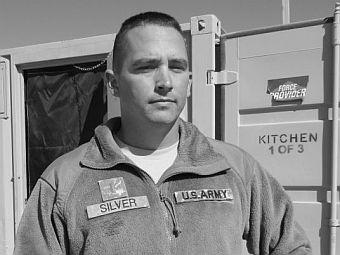Visit The Series Page:
Report From Afghanistan
 (Host) As we approach the 9th anniversary of the start of the war in Afghanistan, the fact that nearly 100 thousand U.S. troops are in that country is not welcome news to a growing number of Americans.
(Host) As we approach the 9th anniversary of the start of the war in Afghanistan, the fact that nearly 100 thousand U.S. troops are in that country is not welcome news to a growing number of Americans.
Impatience and pessimism over the war are common sentiments here.
But in Afghanistan, many Vermont Guard soldiers have a different view. They’re cautiously optimistic that a new counter insurgency strategy and better trained Afghan security forces will pave the way for the eventual departure of combat troops.
VPR’s Steve Zind has more in this Report From Afghanistan.
(Doane) (laughter) "Well, I’ve already had your hospitality when I came before, the cookies and the tea were very nice, thank you."
(Zind) Vermont National Guard Captain Larry Doane works with the Afghan Army and police in a relatively calm province of Afghanistan. Doane is also a VPR commentator. Part of his mission is drinking tea with people like Colonel Shams Uddin of the Afghan National Army.
(Colonel Shams Uddin speaking in Farsi)
(Zind) Speaking through an interpreter, the Colonel is of the opinion that it’s going to take many more meetings over tea before Afghanistan’s security forces can stand on their own without the American military standing next to them.
(Translator) "He’s saying that right now we cannot do everything on our own. We’ve just built our army and we need some more time to get it better and better."
(Zind) The Colonel says a strong presence of coalition forces is needed in Afghanistan for at least several more years. As we approach the beginning of the tenth year of the war, that’s not a welcome message to many Americans.
Yet many Vermonters serving in Afghanistan are counseling patience. They say progress is being made.
First, there’s training the country’s army and police, so they can take over security and relive coalition combat forces.
Staff Sergeant Shawn Seymour of Newport, New Hampshire is on his second deployment to Afghanistan. He’s worked with the Afghan police and army on both deployments,
(Seymour) "I feel very hopeful. Just in the 15 months last time watching them grow as individuals and as soldiers and policemen there was a huge change, all for the better. And just since we’ve been here, it makes me proud to see how much they’ve accomplished and how much better they’re doing."
(Zind) Other Vermonters working with Afghan security forces share Seymour’s sentiments.
Then there’s the effort to win the support of the people by working with local Afghans to build schools, improve farming, and construct highways. This is part of the recently minted counter-insurgency strategy, or COIN. COIN is supposed to inform everything a soldier does – from showing more courtesy when driving a truck through a village to interacting with Afghans on foot patrol.
(Silver) "I totally avoid the hearts and minds cliché."
(Zind) Vermont Guard Lieutenant Daniel Silver of Dover, New Hampshire
"But really that’s what I’m thinking in the back of my mind. Every move we make we have to consider the pros versus the cons and that’s pretty much the COIN fight. We can go out and kill all these guys all day long but in the long run I don’t believe that’s going to be the answer."
(Zind) Silver is a former Marine. He says for some soldiers the transition from a strictly fighting force to a role building relationships with local leaders hasn’t been easy.
(Silver) "There was a lot of training before the mission. I’ve read the counter insurgency manual twice from front to back."
(Zind) For the counter insurgency effort to succeed, though, the Afghan people have to have faith in their government on whose behalf COIN is being implemented. But many, like this military translator named Naz say they’ve lost faith in the government because of widespread corruption. Naz says the corruption begins with Afghan president Hamid Karzai.
(Naz) "He’s president of Afghanistan. He never brought any improvement in his government."
(Zind) Vermont Guard Captain Larry Doane recognizes the stakes. He says corruption threatens to undermine the work the Vermont soldiers are doing in Afghanistan.
(Doane) "Corruption is perhaps the single most difficult problem to overcome here. Without a legitimate partner in the government of Afghanistan, then counter insurgency doesn’t work."
(Zind) Doane says he’s worked with Afghan officials who are sincere about fighting corruption.
The insurgents try not only to exploit the weaknesses of Afghan security forces; in places where the Taliban operates, they’ve set up a government that’s seen by local Afghans as less corrupt than President Karzai’s.
For VPR News, I’m Steve Zind in Kabul, Afghanistan.
(Host) "Report From Afghanistan" is made possible by the VPR Journalism Fund.